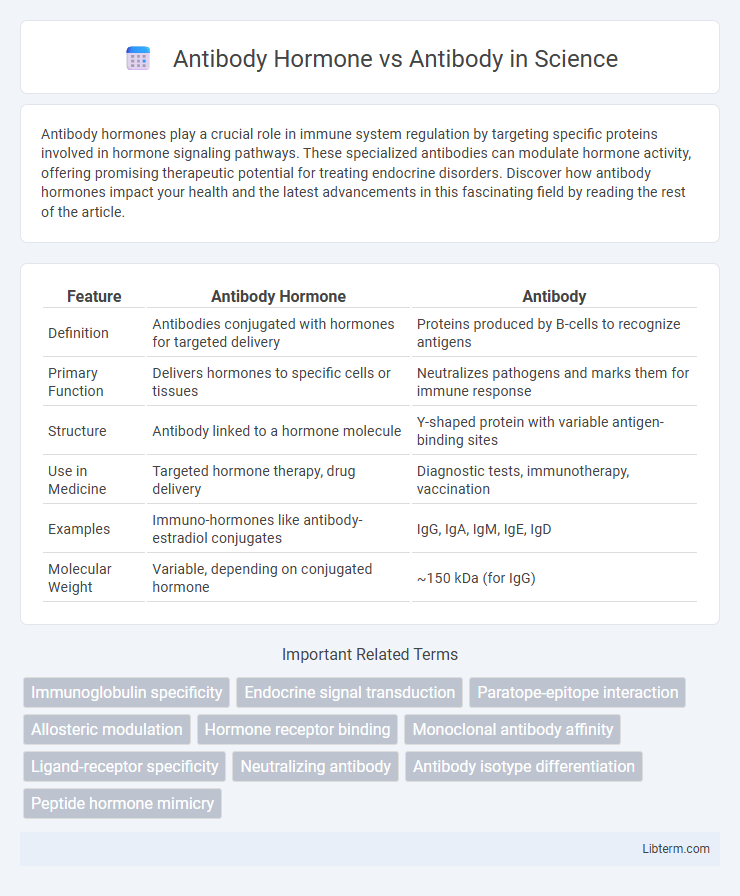Antibody hormones play a crucial role in immune system regulation by targeting specific proteins involved in hormone signaling pathways. These specialized antibodies can modulate hormone activity, offering promising therapeutic potential for treating endocrine disorders. Discover how antibody hormones impact your health and the latest advancements in this fascinating field by reading the rest of the article.
Table of Comparison
| Feature | Antibody Hormone | Antibody |
|---|---|---|
| Definition | Antibodies conjugated with hormones for targeted delivery | Proteins produced by B-cells to recognize antigens |
| Primary Function | Delivers hormones to specific cells or tissues | Neutralizes pathogens and marks them for immune response |
| Structure | Antibody linked to a hormone molecule | Y-shaped protein with variable antigen-binding sites |
| Use in Medicine | Targeted hormone therapy, drug delivery | Diagnostic tests, immunotherapy, vaccination |
| Examples | Immuno-hormones like antibody-estradiol conjugates | IgG, IgA, IgM, IgE, IgD |
| Molecular Weight | Variable, depending on conjugated hormone | ~150 kDa (for IgG) |
Introduction to Antibodies and Hormones
Antibodies are Y-shaped proteins produced by the immune system to identify and neutralize foreign substances like bacteria and viruses. Hormones are chemical messengers secreted by glands that regulate physiological processes such as growth, metabolism, and reproduction. Antibody hormones refer to antibodies engineered to target specific hormones, enabling precise modulation of hormonal activity for diagnostic or therapeutic purposes.
Defining Antibody Hormones
Antibody hormones are specialized proteins that function both as antibodies and hormones, facilitating immune response regulation and cell signaling simultaneously. Unlike typical antibodies that solely recognize and neutralize antigens, antibody hormones actively participate in modulating physiological processes through hormone-like actions. This dual functionality distinguishes antibody hormones in biomedical research and therapeutic development.
What Are Traditional Antibodies?
Traditional antibodies are Y-shaped proteins produced by the immune system to identify and neutralize foreign substances such as bacteria and viruses. These antibodies consist of variable regions that bind specifically to antigens and constant regions that mediate immune responses. Unlike antibody hormones, which act as signaling molecules influencing physiological processes, traditional antibodies primarily serve as key components of immune defense and diagnostic tools.
Structural Differences: Antibody Hormone vs Antibody
Antibody hormones differ structurally from typical antibodies by incorporating hormone-like peptides or small molecule domains fused to the immunoglobulin framework, enhancing their bioactive functions. Regular antibodies consist primarily of variable and constant regions forming a Y-shaped molecule specialized for antigen binding without inherent hormonal activity. The fusion in antibody hormones allows simultaneous antigen recognition and receptor activation, altering signaling pathways distinct from the binding-only role of conventional antibodies.
Functional Roles in the Immune System
Antibody hormones, such as cytokines with hormone-like functions, modulate immune responses by acting as signaling molecules that regulate cell communication, growth, and differentiation. In contrast, antibodies primarily function by specifically recognizing and binding to antigens, neutralizing pathogens, and facilitating their clearance through opsonization and activation of the complement system. Both play crucial but distinct functional roles in the immune system, with antibody hormones influencing immune cell behavior and antibodies targeting foreign invaders directly.
Mechanisms of Action
Antibody hormones function by binding to specific cell surface receptors, triggering intracellular signaling pathways that regulate physiological processes such as metabolism and growth. In contrast, traditional antibodies act by recognizing and binding to specific antigens, marking them for immune system clearance or neutralization without directly altering cellular signaling. The mechanism of antibody hormones involves hormone-receptor interactions that initiate signal transduction, whereas antibodies primarily mediate immune recognition and effector functions like opsonization and complement activation.
Clinical Applications and Therapeutic Uses
Antibody hormones, such as insulin autoantibodies, play a crucial role in diagnosing autoimmune endocrine disorders, enabling targeted therapeutic strategies for conditions like type 1 diabetes. Therapeutic uses of monoclonal antibodies include treatment of cancers and autoimmune diseases by specifically targeting antigens and modulating immune responses. Clinical applications of antibodies involve diagnostics, drug delivery, and immunotherapy, leveraging their high specificity and binding affinity for improved patient outcomes.
Diagnostic Significance
Antibody hormones, such as insulin antibodies, are specifically produced in response to hormone-related disorders and serve as crucial biomarkers in diagnosing autoimmune diseases like type 1 diabetes. In contrast, general antibodies indicate immune system activity against a wide range of pathogens or antigens, providing broader diagnostic information for infections and immune responses. The detection of antibody hormones enables precise monitoring of endocrine dysfunctions, enhancing the accuracy of diagnoses and guiding targeted therapeutic interventions.
Key Similarities and Differences
Antibody hormones and antibodies both function as proteins involved in immune and physiological processes, with antibodies primarily targeting pathogens and antibody hormones acting as signaling molecules regulating bodily functions. Both possess specific binding capabilities; antibodies bind antigens with high specificity, while antibody hormones interact with receptors to elicit cellular responses. Key differences include their roles, as antibody hormones like thyroid-stimulating hormone influence endocrine activity, whereas antibodies mediate immune defense by neutralizing foreign substances.
Future Perspectives in Biomedical Research
Antibody hormones represent a novel class of biomolecules combining the specificity of antibodies with hormone-like regulatory functions, opening new avenues for targeted therapeutics in biomedical research. Advances in protein engineering and molecular biology techniques are expected to enhance the design and efficacy of antibody hormones, enabling precise modulation of cellular pathways in diseases such as cancer and autoimmune disorders. Future perspectives emphasize integrating antibody hormones with personalized medicine and gene editing technologies to improve treatment outcomes and reduce side effects.
Antibody Hormone Infographic

 libterm.com
libterm.com